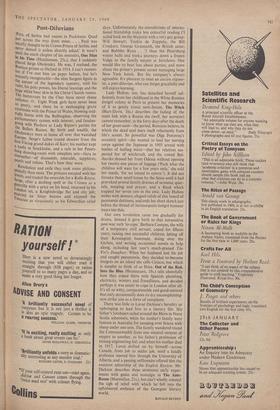Post-Diluvians 'PAUL of Serbia had rooms in Peckwater Quad just
across the way from mine. . . . Paul was usually thought to be Crown Prince of Serbia, and never denied it unless directly asked.' It wasn't until the ninth chapter of his memoirs, One Man in his Time (Hutchinson, 25s.), that I suddenly Placed Serge Obolensky. He was, I realised, the Russian prince at Oxford in 1914. I can't remem- ber if I've met him on paper before, but he's instantly recognisable--the slim Sargent figure in the corner of the legendary tapestry, with his valet, his polo ponies, his liberal leanings and the huge white bear skin in his Christ Church rooms. The buttercups by the Cher have never shone yellower, tit. Eight Week girls have never been so pretty, and there he is exchanging grave Courtesies with the Prince of Wales, blowing mid- night horns with the Bullingdon, observing the Parliamentary system with interest, and fandan- "ng with Pavlova at Lady Ripon's parties for the Ballets Russes. By birth and wealth, the Obolenskys were at home all over that vanished Europe. Serge's father traced descent from the first Viking grand dukes of Kiev; his mother kept a yacht in Stockholm, and a safe in her Peters- burg dressing-room with complete sets—tiara to stomacher—of diamonds, emeralds, sapphires, pearls and rubies. That's how they were. Revolution and exile they took more philoso- Phically than most. The princess escaped with her jewels, and traded the emeralds for a Rolls-Royce. Serge, after a dashing spell in the Crimea as a guerrilla with a price on his head, returned to his London set, a Knightsbridge flat and city job; married an Astor heiress and enjoyed the Twenties as vivaciously as his Edwardian salad
days. Unfortunately the consolations of interna- tional friendship make less colourful reading ('I sailed back on the Majestic with a very gay group: Will Stewart; Tookie de Zoppola; the Bill Crockers; George Grossmith, the British actor; and Bubbles Ryan . • .') than the Petersburg winter balls and troika journeys down a frozen Volga to the family estates at Jerichovo. One would like to hear less about parties, and more about the prince's present career managing large New York hotels. But his company's always agreeable. It's pleasant to meet an ancien regitne- ist, a post-diluvian, who can forget gracefully and still enjoys learning.
Lady Hulton, too, has detached herself suf- ficiently from her childhood in the White Russian emigr6 colony in Paris to present her memories of it as gently ironic semi-fiction. The Witch (Hart-Davis, 16s.) describes the fading of the main link with a Russia she (well, her narrator) cannot remember, in the forty days after the death of her great-aunt—the period, Russians believe,-in which the dead soul tears itself reluctantly from life's scenes. So powerful was Olga Petrovna's eccentric spirit—she wanted to lead her nursing corps against the Japanese in 1905 armed with bottles of boiling water—that her relatives sus- pected her of witchcraft, and the cowed Bol- sheviks shooed her from Odessa without opening her twenty-one pieces of luggage (Tack what the children will want for a few years only,' she told her maids, 'for we intend to return.'). It did not forsake their small house by the Seine until it had provoked several family dramas of sermons, quar- rels, weeping and prayer, and a flood which trapped her seven cats in the attic. Lady Hulton writes with demure, elegant relish of this hoard of passionate dottiness, and ends her short sketch just before the thread of inconsequent dmigrd humour wears too thin.
Our own revolution came too gradually for drama. Instead it gave birth to that intransitive post-war verb 'to cope.' Barbara Comyns, the wife of a temporary civil servant, coped for fifteen years, raising two successful children, letting off their Kensington basement, doing over the kitchen, and writing occasional novels to help along, including last year's much-praised The Vet's Daughter. When her husband lost his job and caught pneumonia, they decided to•become 6migrds on an island she calls Ciriaco, but which is simpler to think of as Ibiza. Out of the Red, Into the Blue (Heinemann, 18s.) tells cheerfully how they coped there with Spanish plumbing, electricity, winters and friendliness, and decided perhaps it was easier to cope in London after all. It's all so witty, companionable and good-natured that only occasionally does its dry uncomplaining- ness strike you as a form of complaint.
There was little in Lovat Dickson's heredity or upbringing to lead him to a literary life. His father's forebears sailed around the Horn in Nova Scotia schooners, while his mother's family were famous in Australia for jumping over fences with sheep under one arm. The family wandered round the Commonwealth from one mineral outpost of empire to another, as his father's profession of mining engineering led; and when his mother died in 1917, Lovat drifted on by himself—across Canada, from job to odder job, until a kindly professor steered him through the University of Alberta, and a passing millionaire offered him the assistant editorship of the English Review. Mr. Dickson describes these strenuous early exper- iences with gusto and nostalgia in The Ante- Room (Macmillan, 21s.), but can't wholly conceal the sigh of relief with which he' fell into the upholstered embrace of the Georgian literary world.
RONALD BRYDEN






































 Previous page
Previous page